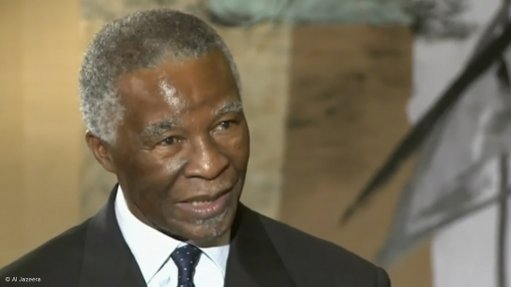
Thabo Mbeki
September 4, 2015.
For Creamer Media in Johannesburg, I’m Sane Dhlamini.
Making headlines:
Embattled national police commissioner Riah Phiyega asks for more time to respond to President Jacob Zuma’s notice of inquiry.
Former president Thabo Mbeki says Africa loses R50-billion every year in illicit flow of funds.
And, the Economist slams the African National Congress on its foreign policy.
Embattled national police commissioner Riah Phiyega late last month told President Jacob Zuma that she needed more time and clarity to make representations to him on why she should not be suspended from the police force. This was pending the outcome of an inquiry into her fitness to hold office.
Zuma had informed Phiyega of his intention to institute an inquiry on August 20. This was a recommendation by the report of the Farlam commission on inquiry into the Marikana massacre in 2012.
He gave her six days to respond, but General Phiyega responded on the 24th of August 2015 requesting further clarity to enable her to respond.
The commission found that top police management had lied about the events leading up to the killing of 34 striking workers at Lonmin’s Marikana mine three years ago and tried to obscure the fact that the operation, which led to their death, was hastily made without evaluation.
Former president Thabo Mbeki has said Africa loses more than R50-billion every year as a result of the illicit flow of funds.
Mbeki said Africa faces the great challenge of large volumes of capital leaving the continent illicitly. This, he said, was money that the continent needed to address the challenges of development.
He told a meeting of the Group of African Governors. The Group is affiliated with the World Bank and the International Monetary Fund, and is known as the African Caucus.
Mbeki said interventions were needed from institutions such as tax authorities, customs, central banks, financial intelligence units for combating money laundering, audit and anti-corruption authorities and the police.
The Economist magazine said the African National Congress (ANC) was turning its back on human rights and freedom by siding with some of the world's ''nastier'' regimes.
In an article on the majority party's documents for its National General Council, it referred to opinions in the discussion document which included that the fall of the Berlin Wall ''marked not the freeing of captive nations in Europe but a regrettable triumph of Western imperialism''.
The magazine said South Africa's foreign policy, based on human rights ideals, were inconsistent when presidents Nelson Mandela and Thabo Mbeki were at the helm, but under President Jacob Zuma they had drifted even further.
It said if the ruling party rejected South Africa’s liberal friends and threw in its lot with some of the world’s nastier regimes, it would be doing Africans a grave disservice.
Also making headlines:
Eskom seeks to learn microgrid lessons from a global best-practice study.
United Nations experts accuse Chad of abuses in the Central Africa conflict.
And, a University of Oxford professor, Mthuli Ncube said China was the biggest external risk to Africa’s growth outlook.
Don’t forget to follow up on Twitter [@PolityZA]
That’s a roundup of news making headlines today.